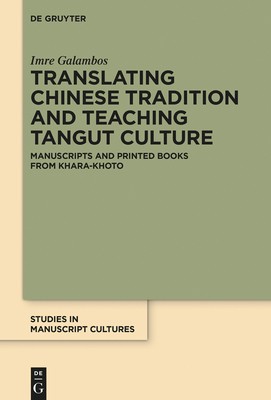
- We will send in 10–14 business days.
- Author: Imre Galambos
- Publisher: De Gruyter
- Year: 2015
- Pages: 326
- ISBN-10: 3110444062
- ISBN-13: 9783110444063
- Format: 15.6 x 23.4 x 1.9 cm, hardcover
- Language: English
- SAVE -10% with code: EXTRA
Translating Chinese Tradition and Teaching Tangut Culture (e-book) (used book) | bookbook.eu
Reviews
Description
This book is about Tangut translations of Chinese literary texts. Although most of the extant Tangut material comprises Buddhist texts, there are also many non-religious texts, which are mostly translations from Chinese. The central concern is how the Tanguts appropriated Chinese written culture through translation and what their reasons for this were. Of the seven chapters, the first three provide background information on the discovery of Tangut material, the emergence of the field of Tangut studies, and the history of the Tangut state. The following four chapters are devoted to different aspects of Tangut written culture and its connection with the Chinese tradition. The themes discussed here are the use of Chinese primers in Tangut education; the co-existence of manuscript and print; the question how faithful Tangut translators remained to the original texts or whether they at times adapted those to the needs of Tangut readership; the degree of translation consistency and the preservation of the intertextual elements of the original works. The book also intends to draw attention to the significant body of Chinese literature that exists in Tangut translation, especially since the originals of some of these texts are now lost.
EXTRA 10 % discount with code: EXTRA
The promotion ends in 19d.21:29:18
The discount code is valid when purchasing from 10 €. Discounts do not stack.
- Author: Imre Galambos
- Publisher: De Gruyter
- Year: 2015
- Pages: 326
- ISBN-10: 3110444062
- ISBN-13: 9783110444063
- Format: 15.6 x 23.4 x 1.9 cm, hardcover
- Language: English English
This book is about Tangut translations of Chinese literary texts. Although most of the extant Tangut material comprises Buddhist texts, there are also many non-religious texts, which are mostly translations from Chinese. The central concern is how the Tanguts appropriated Chinese written culture through translation and what their reasons for this were. Of the seven chapters, the first three provide background information on the discovery of Tangut material, the emergence of the field of Tangut studies, and the history of the Tangut state. The following four chapters are devoted to different aspects of Tangut written culture and its connection with the Chinese tradition. The themes discussed here are the use of Chinese primers in Tangut education; the co-existence of manuscript and print; the question how faithful Tangut translators remained to the original texts or whether they at times adapted those to the needs of Tangut readership; the degree of translation consistency and the preservation of the intertextual elements of the original works. The book also intends to draw attention to the significant body of Chinese literature that exists in Tangut translation, especially since the originals of some of these texts are now lost.


Reviews